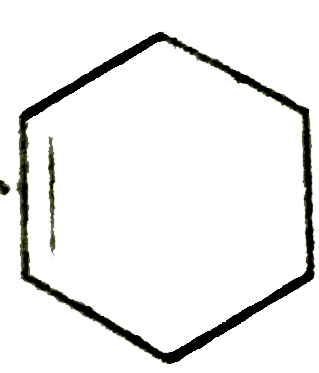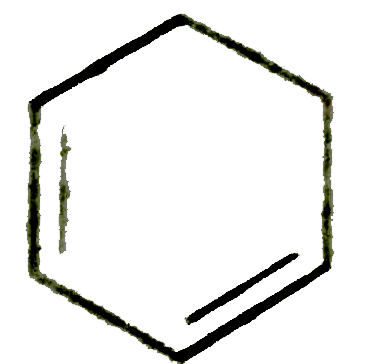Heat of hydrogenation of cyclohexene to cyclohexane is -28.6kcalmole. The observed heat of hydrogenation of benezene to cyclohexane is -49.8 kcal mole. The resonance energy of benzene is
48 kcal mole
36kcal mole
24 kcal mole
12 kca mole
To find the resonance energy of benzene, we will follow these steps:
Step 1: Understand the heat of hydrogenation values
- The heat of hydrogenation of cyclohexene to cyclohexane is given as -28.6 kcal/mole. This value indicates the energy released when one mole of cyclohexene is hydrogenated to cyclohexane.
- The heat of hydrogenation of benzene to cyclohexane is given as -49.8 kcal/mole. This value indicates the energy released when benzene is hydrogenated to cyclohexane.
Hint: Remember that a more negative value indicates a greater release of energy.
Step 2: Calculate the theoretical heat of hydrogenation for benzene
- Benzene has three double bonds, and theoretically, it would require three times the amount of hydrogen to fully saturate it (to convert it to cyclohexane).
- Therefore, the theoretical heat of hydrogenation for benzene can be calculated as:
Theoretical heat of hydrogenation=3×Heat of hydrogenation of cyclohexene
=3×(−28.6 kcal/mole)=−85.8 kcal/mole
Hint: To find the theoretical value, multiply the heat of hydrogenation of cyclohexene by the number of double bonds in benzene.
Step 3: Calculate the resonance energy
- The resonance energy can be calculated by finding the difference between the theoretical heat of hydrogenation and the observed heat of hydrogenation of benzene:
Resonance Energy=Theoretical heat of hydrogenation−Observed heat of hydrogenation
=(−85.8 kcal/mole)−(−49.8 kcal/mole)
=−85.8+49.8=−36 kcal/mole
- Since we are interested in the magnitude of the resonance energy, we take the positive value:
Resonance Energy=36 kcal/mole
Hint: The resonance energy represents the extra stability of benzene due to resonance compared to the theoretical value.
Final Answer
The resonance energy of benzene is 36 kcal/mole.
- The heat of hydrogenation of cyclohexene to cyclohexane is given as -28.6 kcal/mole. This value indicates the energy released when one mole of cyclohexene is hydrogenated to cyclohexane.
- The heat of hydrogenation of benzene to cyclohexane is given as -49.8 kcal/mole. This value indicates the energy released when benzene is hydrogenated to cyclohexane.
- Benzene has three double bonds, and theoretically, it would require three times the amount of hydrogen to fully saturate it (to convert it to cyclohexane).
- Therefore, the theoretical heat of hydrogenation for benzene can be calculated as:
Theoretical heat of hydrogenation=3×Heat of hydrogenation of cyclohexene
=3×(−28.6 kcal/mole)=−85.8 kcal/mole
- The resonance energy can be calculated by finding the difference between the theoretical heat of hydrogenation and the observed heat of hydrogenation of benzene:
Resonance Energy=Theoretical heat of hydrogenation−Observed heat of hydrogenation
=(−85.8 kcal/mole)−(−49.8 kcal/mole)
=−85.8+49.8=−36 kcal/mole
- Since we are interested in the magnitude of the resonance energy, we take the positive value:
Resonance Energy=36 kcal/mole
The resonance energy of benzene is 36 kcal/mole.
Similar Questions
Heat of hydrogenation of cyclohexene to cyclohexane is -28.6 kcal/mol.The observed heat of hydrogenation of benzene to cyclohexane is -49.8 kcal/mol. Calculate the resonance energy of benzene in kcal/mole.
View SolutionCompounds having heat of hydrogenation lesser than that of cyclohexa-1, 4-diene i.e. [Hint resonance energy of benzene is 36 Kcal]
View Solution
Knowledge Check
Enthalpy of hydrogenation of benzene is ΔH1 and for cyclohexene is ΔH2. The resonance energy of benzene is
A3ΔH1−ΔH2B3ΔH2−ΔH1C3ΔH1+ΔH2DΔH1−3ΔH2Heat of hydrogenation of ethene is x1 and that of benzene is x2 . Hence resonance energy of benezene is
Ax2−3x1Bx1+x2C3x1−x2Dx1−3x2Heat of hydronization of ethene is x1 and that of benzene is x2. Hence, resonance energy is :
Ax1−x2Bx1+x2C3x1−x2Dx1−3x2
Heat of hydrogention of
 is 29 kcal mol−1 and that of
is 29 kcal mol−1 and that of  is 56kcalmol−1. Calculate the resonance energy of
is 56kcalmol−1. Calculate the resonance energy of 
View SolutionThe enthalpy of combustion at 25∘C of H2(g), cyclohexane and cyclohexene are -241, 3920 and −3717kJmole−1 respectively. The heat of hydrogenation of cyclohexene is ( Kcal/mole) approximate integer:
View SolutionFind the heat of hydrogenation of cyclohexene if the heat of hydrogenation of benzene is 51 kcal mol−1 and its resonance energy is 36kcalmol−1
View SolutionEnthalpy of hydrogenation of one mole benzene to cyclohexane is :
[Given : Resonance energy of benzene=-70KJ/mol, Enthalpy of hydrogenation of cyclohexene =-100KJ/mol]
View SolutionIf enthalpy of hydrogenation of cyclohexene is [−xkJmol−1] and resonance energy of benzene is [−ykJmol−1] then the enthalpy of hydrogenation of benzene will be
View Solution
